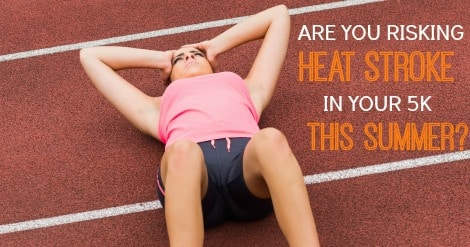It’s approaching summertime again, which for most people means beautiful, sunny days to enjoy the warm weather.
For runners, it means getting ready for hot-weather running.
Most people already know that running a given pace in training is more difficult when it’s hot out—and especially when it’s humid and hot—but this is more of a nuisance than a risk.
Now:
What’s really worrisome for runners is heat illness, or more specifically, heat stroke; a dangerous spike in body temperature.
So, what is heat illness, when are runners at the greatest risk, and how can you avoid it?

Heat illness and it’s impact on running
Research reviewed by the American College of Sports Medicine shows that intense exercise (like running) causes up to a twenty-fold increase in the body’s heat production. Most of this comes from the energy your muscles burn to keep you moving forward.
To prevent overheating, you need to get rid of this heat. The most convenient ways to do so are by directly radiating heat off your skin, or by sweating.
It’s easy to see that your risk of heat illness will be higher when it is hotter and more humid because it is much harder to shed excess heat.
It’s also tougher to stay cool if you’re not used to the heat, which is why taking it easy for a few days while your body adapts to hot weather at the beginning of the summer is a good idea.
You might be wondering:
What’s fascinating about running in the heat is not why a few runners succumb to heat illness on a hot day, but why most runners don’t.
How the body survives overheating
Although the New York Times reported that 49 runners were hospitalized with heat illness at the blistering-hot 2007 Chicago Marathon, nearly twenty-five thousand runners finished just fine.
Check this out:
Research by Ross Tucker and others at the University of Cape Town in South Africa indicates that it’s possible for the human body to survive, and even thrive, while exercising in brutally hot conditions because your brain anticipates the dangers of heat illness on a hot day and scales up your fatigue in response.
In hot conditions, athletes slow down well before their body temperature drifts up to dangerous levels.
Running slower means less heat production, so your body’s heat balance stays neutral.
If runners try to push through fatigue and maintain a fast pace on a hot day, your brain will eventually force you to completely stop running to protect itself.
Knowing this, why does anyone overheat?
The scientific evidence on this is lacking, since it’s both difficult and unethical to induce serious heat illness in a laboratory, but it appears that something goes wrong in your brain—the “anticipatory” heat regulator in your brain malfunctions and does not prevent you from running too fast and too far.
Why heat stroke is more likely in shorter races
Here’s the deal:
As Timothy Noakes, a medical doctor and physiology researcher in South Africa, describes in a 2012 book, serious cases of heat stroke appear to be much more common in shorter running races—those that range from 5 to 15 kilometers, or three to nine miles.
You might be wondering:
Surely longer distances are riskier, since you’re spending more time in the heat?
But because the pace requirements of a marathon or ultramarathon are not that fast, heat production is lower in these long races and body temperature increases are more gradual, perhaps giving your brain more time to recognize the danger and reign in your pace.
In a shorter, harder effort, heat production is much higher and it appears to be easier to “outrun” your brain’s imposed pacing limits.
Noakes cites a report from the medical director of the Twin Cities Marathon, who treated only one case of serious heat stroke in 24 years of the race, contrasting this with the 1988 Famouth Road Race, an 11-km race which produced nine cases of heat stroke in a single day, and the South African 12-km cross country championships in 1981, which produced four cases.
Noakes also conducted a review of case reports published in the scientific literature and found only a handful of cases of heat stroke in marathon and ultramarathon runners, but plenty of cases from shorter distance races. You can learn more about Tim Noakes and his research in our podcast episode)
Factors leading to overheating
Certain factors appear to pre-dispose you to heat illness, and they are associated with disturbances in your body’s heat regulation. Using stimulant drugs is one such factor, but a more relevant one to most people is a recent illness.
Possibly because viral and bacterial infections affect your body’s thermoregulation—think getting a fever when you’ve got the flu—they also interfere with your brain’s heat-protection mechanisms.
This is crazy:
What is perplexing to sports medicine doctors, is that heat illness can even occur in relatively cool weather, when shedding excess heat should be no problem.
Heat production and the brain’s function during exercise play a role, but there’s still a number of mysteries about heat illness that remain to be elucidated.
Conclusion
Despite the remaining uncertainties about heat illness during running, there are a few useful takeaways.
- Don’t do a hard workout or race if you’re sick. If all you’ve got is a cold, research shows there’s no harm in doing a short easy run, but if you are feeling ill and it’s hot out, scrap the intervals or the 5k road race.
- Your risk for heat illness appears to be highest during medium-length, high-intensity efforts like a five-mile race or a six-mile hard tempo run. Something longer and slower, like a long run or a marathon, is safer in brutal heat.
- When working out in the summer, try to include rest breaks and use them to stay cool. Instead of a 6 mile tempo, try 2 x 3 miles or 3 x 2 miles slightly faster with a short rest. Keep a cooler full of towels you’ve frozen the night before and put them on you during the recoveries.
- Heat illness, though a serious issue, is quite rare. Following these steps, along with staying hydrated, taking electrolytes (we recommend EnduroPacks Electrolyte Spray), and listening to your body, should mitigate your risk of overheating when you run on a hot day.
RunnersConnect Bonus
Download your FREE Sweat Rate Calculator now.
If you are unsure about how to calculate how much water to consume, and electrolytes to use, this will give you your exact needs.




One Response
I’ve been waiting for an article like this to put my two cents in. Last year I read all about running in the heat, pre-cooling, cooling studies, etc. on your site and one really interested me. Studied subjects run with some sort of cooling gel pads in their hands and there was no noticeable effect on their performance.
To make it short, I got to running with a frozen half liter bottle of water in my hand and it was a godsend all summer. I definitely
noticed increased performance even during predawn when I usually run my 9 miles. And it makes one feel so much better during the most obnoxious summer heat.
Toss a bottle full of water into the freezer twelve hours or so before a run and then enjoy. I sometimes juggle the bottle from hand to hand if it gets too cold or toss it into my running pack. Drink it slowly while it melts and squeeze the bottle to make full contact with remaining ice and prevent annoying rattling. After two thirds of a nine mile run in something like 20 – 23 C heat all I have left is ice water. I’ve already used this method this year and the one time I run in moderate heat without ice I felt much worse. As an added bonus, an ice brick in your hand really wakes you up.
Hope somebody can use that tip.
P.S. Love the website.
Paul